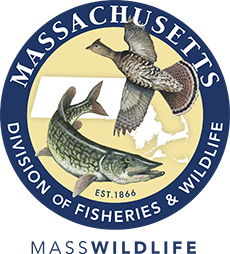- Division of Fisheries and Wildlife
- MassWildlife's Natural Heritage & Endangered Species Program
An updated version of BioMap, an online tool that identifies critical lands and waterways throughout the Commonwealth in need of conservation, was released in November by MassWildlife and The Nature Conservancy (TNC) in Massachusetts. The web portal delivers the latest scientific data and resources to help state and local governments, land trusts, non-government organizations, and other conservation partners strategically plan projects to conserve wildlife and their habitats. The latest version of BioMap combines more than 40 years of rigorously documented rare species and natural community records from MassWildlife with cutting-edge climate resilience data from The Nature Conservancy and spatial data identifying intact fish and wildlife communities, habitats, and ecosystems that are the focus of the Massachusetts State Wildlife Action Plan.
BioMap offers users a detailed view of habitats, species, and resilient landscapes, both locally and statewide. BioMap users can customize data and use the site’s new online Habitat Restoration Resource Center to plan habitat management and land stewardship projects. Additionally, BioMap provides strategies to help communities prepare for, recover from, and adapt to climate change, while bolstering habitat resilience. Taken together, these efforts help to protect the state’s extraordinary biodiversity now and into the future.
New BioMap features
The current BioMap incorporates enhanced knowledge of biodiversity and habitats, improved information on the threats to biodiversity, and new understandings of how to ensure that natural systems are more resilient in the face of climate change. This BioMap release contains new features including:
- Local and regional scaling allowing users to get data at a municipal level or to identify regionally significant natural resources
- New climate resilience data including TNC’s Resilience and Connected Network analysis and aquatic climate change refugia
- New rare species data
- Expanded aquatic data
- Habitat management and restoration planning tools
- Updated land use and land cover information
Learn more about BioMap
Whether you’ve been using BioMap for years or just getting started, there are opportunities to start leveraging the data in the new release:
- Start exploring the BioMap now by visiting mass.gov/BioMap.
- BioMap Webinar on January 18
Join Assistant Director of MassWildlife's Natural Heritage and Endangered Species Program Eve Schluter and TNC's Conservation Ecologist Andy Finton for a demonstration of the new BioMap. The webinar will begin at 7 p.m. on Zoom. Click here to register for the webinar. - Email natural.heritage@mass.gov to request BioMap technical support or to request notification of future trainings.

